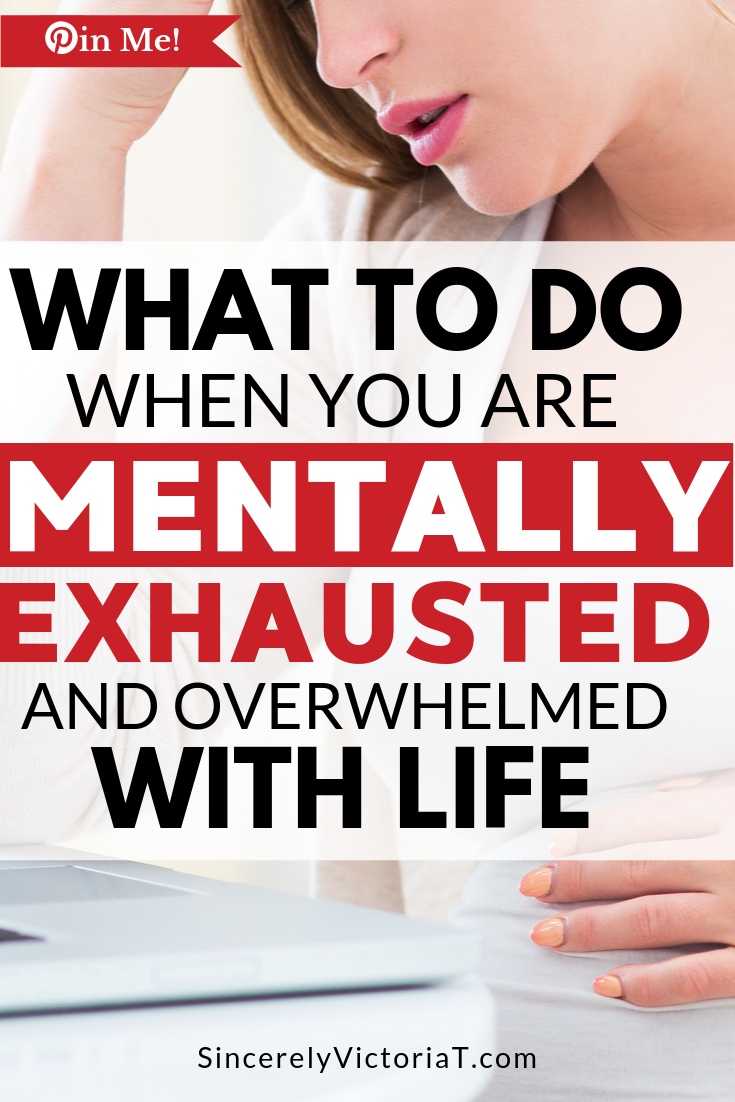Cases of mental exhaustion are becoming more prevalent among women than ever before. Like mental health disorders, mental exhaustion has very subtle symptoms and affects psychological health. Mental exhaustion happens more than we realize and can happen to anyone who experiences long-term stress. Many times women experience mental and emotional exhaustion and don’t know it. They assume they are just tired or sad and keep on with their same day-to-day routine. If you are constantly always stressed out or overworked, pay attention to warning signs you are mentally exhausted.
Hard-working women all over the world are experiencing mental exhaustion more and more. From working high-pressure occupations to working long hours as a wife and a mom, it’s easy to experience feelings of exhaustion on a regular basis. Some women experience emotional exhaustion after a hard life experience or a devastating life event. Mental exhaustion is a sign of physical and mental burnout and can manifest itself in many ways in different people. Pay attention to the warning signs, and never underestimate when your body is trying to warn you that something is wrong.
Exhaustion may be physical (in your body) or psychological (in your mind). Don’t ignore the warning signs.
As a hard-working woman, it may be hard to diagnose mental exhaustion because the signs are so subtle. Do you have a headache because you are dehydrated or are your hormones out of balance? Are you upset because of what happened, or are you just cranky because you didn’t get enough sleep last night? When you are busy taking care of others, sometimes its easy to overlook yourself. If you aren’t feeling like yourself and your symptoms last for long periods of time, you may be experiencing signs of mental exhaustion.
21 Warning Signs You are Mentally and Emotionally Exhausted
For some people, mental and emotional exhaustion can feel like they are depressed or have no power over what happens in their life. For others, lack of energy, poor sleep, and decreased motivation can make it difficult to overcome emotional exhaustion. Over time, being in a constant stressed-out state can cause permanent damage to your health.
- easily irritated
- feel unmotivated
- experiencing anxiety
- having trouble sleeping
- no patience
- having indigestion and stomach problems
- crying unexpectantly
- feeling empty
- lack of motivation
- physical fatigue
- feelings of hopelessness
- absentmindedness
- apathy
- headaches
- change in appetite
- nervousness
- difficulty concentrating
- quick to anger
- increased cynicism or pessimism
- sense of dread
- depression
If you are experiencing any of the above signs, it may be time to slow down and make a few lifestyle changes. Experiencing mental and emotional exhaustion should be taken very seriously. If you feel you need individual or specialized help, seek medical advice from a professional such as a psychologist, psychiatrist, or social worker. If you’re not sure where to turn, ask your doctor for a referral.

7 Things to Do If You Are Mentally Exhausted
If you are emotionally exhausted, start by making a few lifestyle changes such as:
1. Give yourself a break. The best way to cure exhaustion is to just rest. Allow yourself a day or two to do nothing. Use this time to focus on the present moment and not worry about tomorrow.
2. Take inventory. Determine who and what is causing you to feel overwhelmed, stressed, and exhausted. Is your job causing you stress? Do you have a friend that you need to distance yourself from?
3. Take care of yourself. Mental health and physical health are related. Be sure you are taking care of your body by eating well, sleeping well, and exercising. Simple changes in your eating and sleeping habits can help you to feel better.
Click here to read: Healthy Foods to Boost Your Mood
4. Slow down. Mental exhaustion is the result of long-term stress, so stay away from people and things that cause you to feel stressed. Replace your stressful activities with ones that help you to relax and put a smile on your face.
5. Learn to say NO. You don’t have to be everything for everybody all the time. Setting boundaries is a great way to decrease the stress-causing activities that are causing exhaustion in your life. It is OK to say NO – and don’t feel guilty for doing so.
6. Ask for help. Do you have a strong support system of people who love you? If so, utilize their help. If the kids have been driving you insane all day, ask your best friend to babysit while you take a drive around the neighborhood in silence. You don’t have to be perfect all the time, so ask for help when you need it.
7. Give yourself grace. Please remember, you are not alone, and your feelings are valid. Many of us become exhausted because we are too hard on ourselves. Many perfectionists suffer from mental exhaustion due to wanting everything to be perfect. Remind yourself that life is not always ideal and sometimes things don’t go as planned. Blaming yourself can only make your emotional exhaustion worse.
Recovering from mental exhaustion takes time. Take small simple steps toward getting better each day. If you do not start to feel better soon and still show signs you are mentally exhausted, please consult with a physician, psychologist, psychiatrist, group counselor, social worker, or trained clergy member to help you rebuild your emotional energy.
I hope this helps!






Leave a Reply